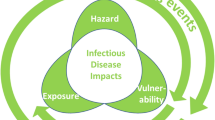Abstract
Global assessment of the potential impacts of anthropogenically-induced climate change on vector-borne diseases suggests an increase in extent of the geographical areas susceptible to transmission of malarial Plasmodium parasites, dengue Flavivirus and Schistosoma worms. The transmission potential of the three associated vector-borne diseases studied is highly sensitive to climate changes on the periphery of the currently endemic areas and at higher altitudes within such areas. Our findings vis-à-vis the present endemic areas indicate that the increase in the epidemic potential of malaria and dengue transmission may be estimated at 12–27% and 31–47%, respectively, while in contrast, schistosomiasis transmission potential may be expected to exhibit a 11–17% decrease.
Similar content being viewed by others
Author information
Authors and Affiliations
Rights and permissions
About this article
Cite this article
Martens, W.J.M., Jetten, T.H. & Focks, D.A. SENSITIVITY OF MALARIA, SCHISTOSOMIASIS AND DENGUE TO GLOBAL WARMING. Climatic Change 35, 145–156 (1997). https://doi.org/10.1023/A:1005365413932
Issue Date:
DOI: https://doi.org/10.1023/A:1005365413932




